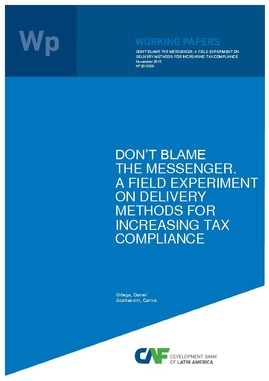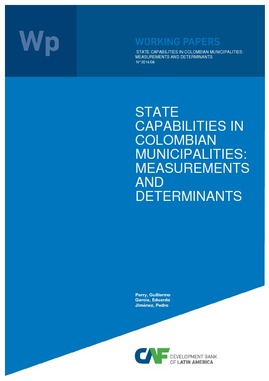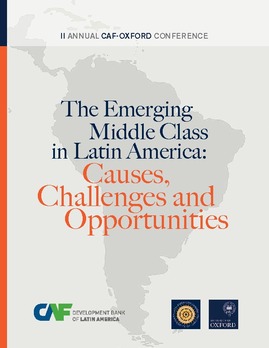| dc.contributor.author | Ortega, Daniel | |
| dc.contributor.author | Scartascini, Carlos | |
| dc.coverage.spatial | Colombia | en_US |
| dc.date.accessioned | 2015-11-16T20:27:47Z | |
| dc.date.available | 2015-11-16T20:27:47Z | |
| dc.date.issued | 2015-11 | |
| dc.identifier.citation | Ortega, D., & Scartascini, C. (2015, November). Don’t blame the Messenger. A Field Experiment on Delivery Methods for Increasing Tax Compliance. CAF – Working paper;2015/09, Caracas: CAF. Retrieved from https://scioteca.caf.com/handle/123456789/821 | en |
| dc.identifier.uri | https://scioteca.caf.com/handle/123456789/821 | |
| dc.description.tableofcontents | The effect of different delivery mechanisms for increasing tax compliance has not been evaluated so far. This study conducts a field experiment in Colombia that varies the way the National Tax Agency contacts taxpayers on payments due for income, value added, and wealth taxes. More than 20,000 were randomly assigned to a control or one of three delivery mechanisms. Results indicate large and highly significant effects, as well as sizable differences across delivery methods. A personal visit by an inspector is more effective than a letter or an email, conditional on delivery; which has several relevant academic and policy implications. | en_US |
| dc.language.iso | en_US | en_US |
| dc.publisher | CAF | en_US |
| dc.relation.ispartofseries | CAF – Working paper;2015/09 | |
| dc.rights | CC-BY-NC | es_ES |
| dc.rights.uri | http://creativecommons.org/licenses/by-nc/4.0/ | es_ES |
| dc.subject | Impuestos | en_US |
| dc.subject | Investigación socioeconómica | en_US |
| dc.subject | Evaluación de impacto | en_US |
| dc.title | Don’t blame the Messenger. A Field Experiment on Delivery Methods for Increasing Tax Compliance | en_US |
| dc.type | workingPaper | en_US |
| dc.publisher.city | Caracas | en_US |





